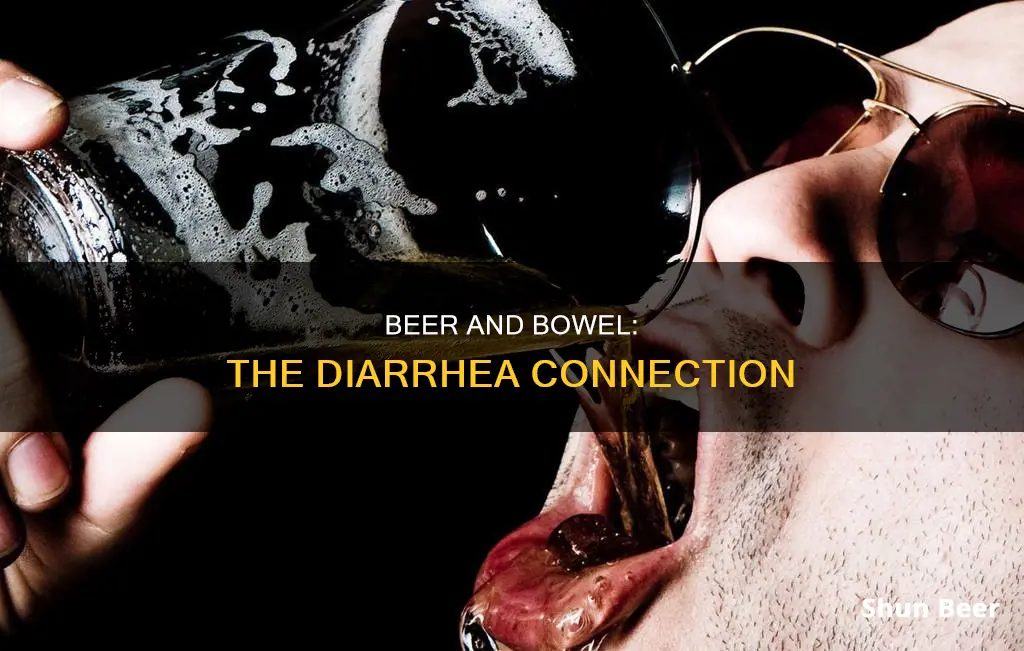
Alcohol is a central nervous system depressant, and even low to moderate alcohol use can contribute to digestive issues. Drinking beer every day can cause diarrhea due to its impact on the gastrointestinal tract. Alcohol can irritate the gut, speeding up digestion and affecting water absorption, resulting in loose stools. Beer also contains carbohydrates that are harder to digest, which may lead to diarrhea. Additionally, the sugar content in alcoholic beverages can increase fluid in the digestive tract, contributing to short-term loose stools. While moderate drinking may not cause issues, heavy drinking can definitely mess with your intestines.
| Characteristics | Values |
|---|---|
| Reason | Alcohol can irritate the gut and the body tries to excrete it as quickly as possible. |
| Water Absorption | Alcohol impairs the function of the large intestine and hampers water absorption. |
| Faster Digestion | Alcohol agitates the intestines and causes them to react by speeding up digestion. |
| Bacterial Imbalance | Alcohol can cause chemical imbalances in the digestive system, leading to gastrointestinal distress. |
| Inflammation | Alcohol can cause inflammation in the lining of the digestive system. |
| Digestion | Alcohol can delay digestion and cause constipation. |
| Dehydration | Alcohol can cause dehydration, which can lead to constipation. |
| Food | Eating before drinking can slow the absorption of alcohol and aid digestion. |
| Carbohydrates | Beer contains carbohydrates that are harder for the body to digest. |
What You'll Learn
- Alcohol irritates the gut and the body works to excrete it quickly
- Alcohol can cause inflammation and increase acid production in the digestive system
- Alcohol can cause bacterial imbalance in the intestines
- Alcohol can lead to dehydration, which can cause constipation
- Drinking on an empty stomach can cause alcohol to be absorbed faster, leading to diarrhoea

Alcohol irritates the gut and the body works to excrete it quickly
Alcohol is a known gut irritant and can cause digestive issues. As a central nervous system depressant, alcohol reduces the efficiency of bodily organs, including the gastrointestinal tract.
When alcohol enters the body, it is absorbed into the bloodstream through the lining of the stomach walls. While it sits in the stomach, alcohol can damage the cells, create inflammation, lesions, and increase the microbial degradation of the stomach's contents. This process can wear away the stomach lining and cause inflammation and pain (a condition known as gastritis).
The body attempts to expel alcohol quickly, which means that water in the stomach is not absorbed into the colon at the usual rate, leading to diarrhoea. This is because alcohol can cause the muscles around the large intestine to contract more frequently, moving stool out of the body before liquid can be absorbed by the large intestine.
Additionally, alcohol can affect the intestinal bacteria, leading to imbalances that result in gastrointestinal distress. The body's response to this bacterial imbalance is to excrete the contents of the stomach and intestines as soon as possible, which can also result in diarrhoea.
Furthermore, alcohol impairs the function of the large intestine and hampers water absorption, which can lead to diarrhoea-like symptoms due to the intestines' inability to properly digest the contents of the gastrointestinal tract.
Finally, alcohol abuse can lead to chronic diarrhoea, which can be a sign of an underlying gastrointestinal disorder such as irritable bowel syndrome (IBS), Celiac disease, or Crohn's disease.
Malt Drinks and Beer: What's the Difference?
You may want to see also

Alcohol can cause inflammation and increase acid production in the digestive system
Alcohol can have a significant impact on the digestive system, and drinking beer every day can potentially lead to diarrhea and other gastrointestinal issues. While moderate drinking may not cause significant problems, chronic and heavy alcohol consumption can have more severe effects, including inflammation and increased acid production in the digestive system.
Alcohol can irritate and inflame the cells lining the stomach and intestines. This inflammation can interfere with the normal functioning of the digestive system, impacting digestion and absorption of nutrients. Alcohol also affects the production of stomach acid, reducing the stomach's ability to destroy bacteria. This can allow harmful bacteria to enter the upper small intestine, leading to potential infections and further inflammation.
In addition to its direct effects on the digestive system, alcohol also impacts the liver, which plays a crucial role in metabolism and detoxification. The liver breaks down more than 90% of alcohol consumed, converting it into a highly toxic chemical called acetaldehyde. This process can damage liver cells and increase the risk of liver diseases such as cirrhosis.
Alcohol can also alter the composition and function of intestinal microbiota, leading to an imbalance between beneficial bacteria and pathogenic bacteria. This dysbiosis can contribute to intestinal inflammation and impact overall gastrointestinal health. Additionally, alcohol can increase the permeability of the intestinal lining, allowing pathogens and toxins to enter the bloodstream and contribute to systemic inflammation.
The impact of alcohol on the digestive system is complex and far-reaching. Chronic and heavy drinking can lead to a range of gastrointestinal issues, including inflammation, altered acid production, and an increased risk of various digestive disorders and cancers. Reducing alcohol consumption or abstaining from alcohol can help mitigate these negative effects and improve digestive health.
Warm Beer: A Cultural Preference or Climate Influence?
You may want to see also

Alcohol can cause bacterial imbalance in the intestines
Alcohol can indeed cause bacterial imbalance in the intestines, which can lead to diarrhea.
The human digestive system is home to approximately 100 trillion bacteria, and while some of these bacteria are beneficial, others can be harmful. Alcohol consumption can cause an imbalance in this bacterial ecosystem, known as dysbiosis, where the ratio of good to pathogenic bacteria is disrupted. This imbalance can lead to an increase in harmful bacteria and a decrease in beneficial bacteria, such as strains of Lactobacillus and Bifidobacterium.
Alcohol can directly stimulate bacterial overgrowth, but it can also indirectly impact bacterial growth by affecting digestive and intestinal function. For example, alcohol consumption can lead to abnormal intestinal motility, altering the ability of the intestine to move food along. Additionally, alcohol can affect bile acid metabolism, and bile acids, in turn, can influence intestinal bacteria.
This bacterial imbalance can have several negative consequences. Firstly, it can lead to an increase in the release of endotoxins, which are produced by gram-negative bacteria. Endotoxins are harmful as they activate proteins and immune cells that promote inflammation throughout the body. This inflammation can then exacerbate alcohol-induced organ damage, creating a cycle of harm.
Furthermore, the overgrowth of harmful bacteria can lead to intestinal hyperpermeability, also known as "leaky gut." This condition increases the permeability of the intestinal barrier, allowing pathogens and toxins to enter the bloodstream. As a result, bacterial and toxic byproducts can infiltrate other organs, causing local and systemic inflammation and contributing to liver disease, neurological disease, gastrointestinal cancers, and inflammatory bowel syndrome.
To restore balance to the gut microbiome, it is essential to address alcohol consumption patterns. Reducing alcohol intake or abstaining from alcohol can help prevent alcohol-induced dysbiosis and its associated health risks. Additionally, dietary interventions, such as increasing fibre and probiotic-rich foods, can support the restoration of a healthy gut microbiome.
Mixing Beer and Gin: A Match Made in Heaven?
You may want to see also

Alcohol can lead to dehydration, which can cause constipation
Drinking beer every day can cause diarrhea, but it can also lead to constipation. Alcohol can affect the body in several ways, and the amount and type of alcohol consumed play a role in its impact on the digestive system.
Alcohol is a central nervous system depressant, and it can affect the body's hormone production and intestinal movement. It can also cause dehydration, which can lead to constipation. Here's how:
Dehydration and Constipation
Alcohol reduces the secretion of the antidiuretic hormone (ADH) or vasopressin, which signals the body to retain water. With less ADH, the body loses more fluid than usual, leading to dehydration. Dehydration can cause constipation because the body needs water for stools to absorb. When the body is dehydrated, stools become harder and lumpier, making them more challenging to pass.
Intestinal Movement and Constipation
Alcohol can affect intestinal movement or peristalsis in different ways. Drinks with an alcohol content of more than 15% have an inhibitory effect on peristalsis, slowing gastrointestinal motility, which can lead to constipation. On the other hand, beverages with lower alcohol content, such as beer and wine, can increase gastric emptying rates, which could lead to diarrhea.
Gut Bacteria and Constipation
Some evidence suggests that alcohol consumption can cause an overgrowth of bacteria in the intestines, leading to constipation, bloating, and other symptoms. Alcohol can also interfere with inflammatory bowel disease (IBD) and affect the absorption of medications used to treat IBD, potentially worsening symptoms.
Preventing Constipation
To prevent constipation, it is recommended to drink plenty of water or other hydrating fluids when consuming alcohol. It is also important to understand the alcohol content of drinks and practice moderation. Eating before drinking can also help slow alcohol absorption and aid digestion, resulting in thicker bowel movements.
Is Non-Alcoholic Beer Really Sober Drinking?
You may want to see also

Drinking on an empty stomach can cause alcohol to be absorbed faster, leading to diarrhoea
Alcohol is known to irritate the gut, and our bodies try to excrete it as quickly as possible. This means that when there is alcohol in the large intestine, the water in the stomach is not absorbed at the normal rate, leading to diarrhoea.
Alcohol can also cause inflammation of the gastrointestinal tract, which can lead to more frequent bowel movements and diarrhoea. It can also lead to an increase in acid production in the stomach, which can irritate the stomach and cause diarrhoea.
In addition, alcohol can disrupt the balance of bacteria in the intestines, which can cause them to malfunction and lead to diarrhoea.
Finally, drinking large amounts of alcohol can cause fluid overload in the gut, which can also lead to diarrhoea.
Beer Cans: Safe Drinking Vessels?
You may want to see also
Frequently asked questions
Beer has more carbohydrates compared to other alcoholic drinks, and the body can have trouble breaking these down while processing alcohol. This can lead to diarrhea.
Alcohol can cause the intestines to speed up digestion, irritate the gastrointestinal tract, and affect water absorption, all of which can lead to diarrhea.
Yes, drinking beer on an empty stomach can increase the risk of diarrhea as food slows the absorption of alcohol. Binge drinking and eating heavy foods while drinking can also increase the risk.
It is recommended to drink in moderation, eat before drinking, and consume water or other hydrating fluids between alcoholic drinks.







